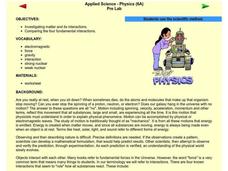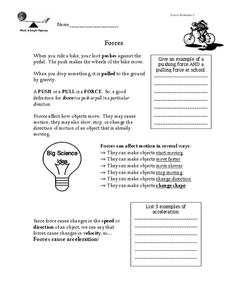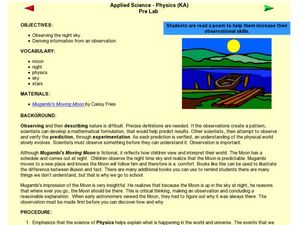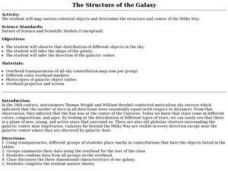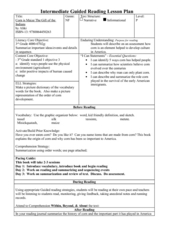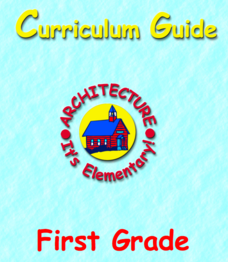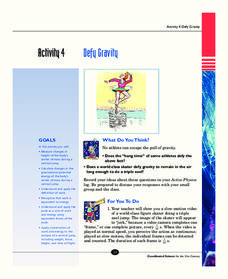Curated OER
Performing Transformations
Learners investigate the concepts relating to creating a tessellation. They include using pattern blocks in order to create interconnecting patterns. Students review translations, rotations, and reflections.
Curated OER
The Math of Light
Investigate light intensity, illuminance, and power consumption of different light source.Compare the efficiency of light bulbs then create a persuasive advertisement about it.
Curated OER
Personal Fitness
Young scholars research important personal fitness and sport concepts through note taking, internet research, data collection, and the website Quia. Development of concept maps are also encouraged.
Mr. E. Science
Forces
May the mass times acceleration be with you. The presentation covers forces, Newton's three Laws of Motion, momentum, and vectors.
Curated OER
Matter and Energy
Students explore energy by completing a science worksheet in class. In this principles of matter lesson, students define the vocabulary terms force, gravity, nuclear, and electromagnetic before reading assigned text about energy....
Curated OER
Graham's Laws: Diffusion and Effusion of Gases
Learners conduct a series of experiments to explore Graham's law. In this chemistry lesson, students differentiate effusion and diffusion. They perform calculations using Boyle's, Henry's, Charles' and Graham's Laws.
Curated OER
Make a Pinhole Viewer
In this light learning exercise, students construct a pinhole viewer using a paper box, wax paper, tape and a pushpin. They answer six questions about their observations, the orientation of the images they saw, and the results of their...
Curated OER
Forces
In this forces worksheet, young scholars read about force and acceleration. They complete a Venn Diagram to compare and contrast balanced and unbalanced forces, they answer questions about a diagram of a tug-a-war and the forces acting...
Curated OER
Forces
In this forces worksheet, students read about what affects the force on an object. Students identify push forces and pull forces in 5 diagrams. They answer 13 questions about the forces in two diagrams and they draw vector diagrams to...
Curated OER
Domino Dash
In this speed worksheet, students use dominoes to measure the average speed of rows falling over. Students make a line graph to show the relationship between the length of the domino row and the time. Students answer 8 questions about...
Curated OER
Poetry and Observations
Students compare poetry and the night sky. In this poetry lesson, students read poetry and compare the imagery from the poem with the night sky. Students explore how science and poetry relate to one another.
Curated OER
The Structure of the Galaxy
Students infer the galaxy shape. In this structure of the galaxy instructional activity students observe the distribution of objects in the sky and answer questions.
Curated OER
Straw Rockets in Flight! Engineer's Delight
Sixth graders study air compression and how it can power a rocket. In this creative instructional activity students work with a partner and build a rocket then compare air compressions and graph their results.
Curated OER
MEASURING THE DENSITY OF WATER
Students perform an experiment to measure the density of tap water vs. salt water.
Curated OER
Intermediate Guided Reading Lesson Plan for: Corn is Maize The Gift of the Indians
A lovely guided reading lesson awaits you and your students. They read the book,Corn is Maize: The Gift of the Indians, by Aliki, summarize the important events of the story, and describe how corn has helped develop culture in America.
Curated OER
Y-Intercept and Slope Intercept Form
Alegebra amateurs identify the slope and the y-intercept given a linear equation in slope-intercept form by correctly completing some in class problems. They write the linear equation in slope-intercept form that corresponds to the given...
Normal Community High School
Classification of Matter
Steel is an example of homogeneous mixture, also called an alloy, which is made of iron and carbon. The presentation introduces learners to elements, compounds, and mixtures. They explore their similarities and differences, and then take...
US Institute of Peace
Observing Conflict
Can your class manage conflict? Give them the tools they need to succeed at conflict resolution with the third lesson in a 15-part series of peacebuilding activities. Learners draw from personal conflict experience as they analyze...
American Institute of Architects
Architecture: It's Elementary!—First Grade
Build an interest and appreciation for architecture in your young learners with this fun 10-lesson art unit. Engaging children in using their five senses, the class first observes the environment around them, paying...
Beyond Benign
Puzzler
Are some packaging materials superior to others? Using sustainability as a guide, scholars analyze different packing materials to describe their life cycles. They create puzzles to communicate their findings.
It's About Time
Defy Gravity
Test the limits of gravity while encouraging full class participation with this thrilling lesson. Pupils investigate the meaning of work and how it is equivalent to energy. They explore the joule and apply it as a unit of work. They...
It's About Time
Run and Jump
Has your class wondered how fast a human could run or how high they are capable of jumping? Help them understand these concepts as they explore acceleration and use an accelerometer to make semiquantitative measurements of acceleration...
It's About Time
The Mu of the Shoe
What is mu? Emerging scientists explore the coefficient of sliding friction, or mu, and apply its concepts as they complete activities in the interesting lesson. They measure the sliding friction between soles of their own athletic shoes...
EngageNY
Why Are Vectors Useful? 1
How do vectors help make problem solving more efficient? Math scholars use vectors to represent different phenomenon and calculate resultant vectors to answer questions. Problems vary from modeling airplane motion to the path of a...




